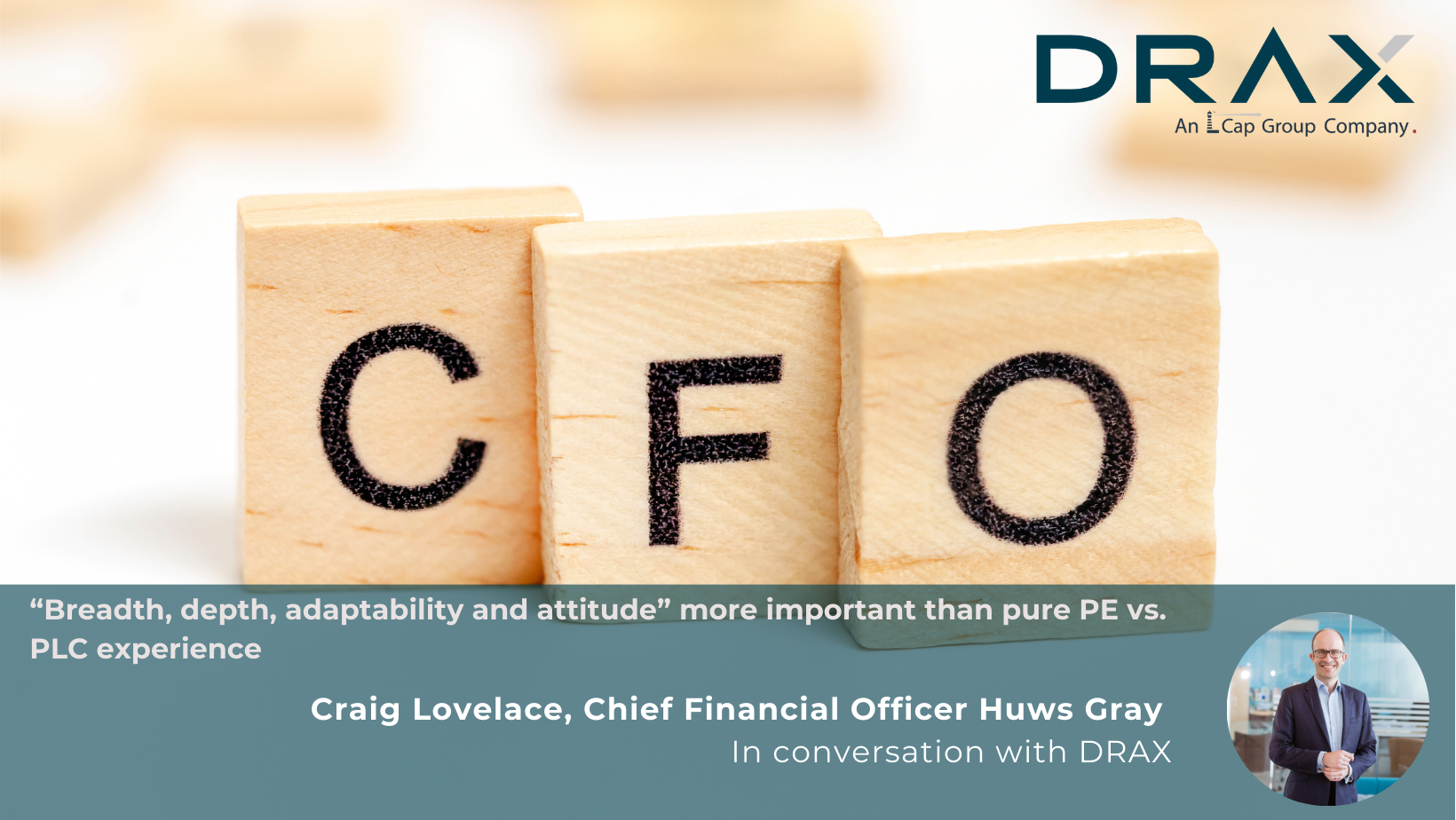Contact Us
If you’re seeking ways to invest in leadership teams or require the expertise, guidance and support of a strategic-led implementation partner, then contact us today and a member of our team will be in touch soon.

July 30th, 2024

For a CFO, the jump from PLC to private equity (“PE”) has often been seen as notoriously challenging. But in many cases, it’s part and parcel of a varied career path, giving finance leaders a breadth and depth of experience as they move through different businesses, economic cycles and roles. It’s time to normalise the PLC to PE crossover.
Much has been written about the challenge of transitioning from the role of CFO in a Listed business to a private equity-backed environment. There is a common view that the choice is binary; you’re either one or the other. Pick your side. But today, the difference between the two is not as stark as in the past and many CFOs naturally and seamlessly move between ownership structures.
As part of our recent CFO event on this topic, we spoke to Craig Lovelace, Chief Financial Officer at Blackstone-backed Huws Gray, whose experience spans FTSE 100, 250, Large-Cap PE, and hybrid ownership companies. Lovelace is an example of a CFO who has actively sought out roles that have provided different challenges, and he has thrived on that diversity, attributing his current position to the depth and breadth of experience the journey has given him.
“From a personal perspective, there was limited benefit in taking very similar roles to those I’ve had in the past, and I believe having varied experiences over my career has brought huge value. I didn't want to repeat what I'd already done,” he says with respect to the decision process in joining Huws Gray. “For me, new experience, growth, and development are essential, and having this breadth and depth has set me up well for where I am now.”
Here, we explore his experiences as a CFO in the two environments, the key similarities and differences, and the lessons other CFOs and investors can draw on when seeking new positions and progressing through their careers.
Outdated perceptions of PLC
Plenty of generalisations are still made about the nature of PLC and PE leadership roles, but Lovelace believes many of these perceptions are increasingly outdated. For example, the idea that a PLC CFO doesn’t need to be ingrained in the day-to-day operational and commercial drivers of the business no longer fits the reality.
“I think there's a perception that as a PLC CFO, you're spending a significant minority of your time on the road with shareholders, but that isn't necessarily the case for most,” he explains. “If you're a mid-cap CFO, you're probably now spending more targeted time with shareholders, which means by far and away the lion’s share of your focus remains “in” the business, understanding margins, operations, logistics, property, technology, supply chain etc.”
Another misconception is that private equity-backed businesses are always faster moving, demanding greater decision-making agility. However again, Lovelace believes that times have moved on, particularly in sectors such as retail, which are undergoing rapid change and disruption.
“There's a perception, perhaps amongst some PE investors, that a PLC environment can be less pacey, which I’ve not found to be the case,” he says. “Food retail and consumer home/fashion, for example, are extremely fast paced. Constant change – be that in the market, in consumer behaviours, preferences or ways of accessing services and products - means you need to move quickly in response, but not be a slave to simply following others.”
Adapting to different stakeholders
Of course, both environments have unique challenges that impact the competencies and approach needed by the CFO. In a PLC, CFOs must consider a large variety of public stakeholders constantly and maintain confidence in earnings calls and other public stakeholder engagement. This can inevitably lead to a risk of short-termism and a reduction in the confidence and longer-term vision to drive significant change.
“Being a FTSE 250 PLC CFO was, at times, a tough gig because what we were undertaking at N Brown was a major business model transformation in the gaze of public markets,” says Lovelace. “Changing the essence of the business’s trading approach (omni channel to pure online), its brand, customer base and the underlying culture of a business – and communicating that on a six-monthly earnings cycle – proved challenging at times. This is especially the case if unforeseen roadblocks arise as this can delay the all-important momentum of demonstrating change, delivering business and performance improvement. Investors can, and regrettably do, lose patience.”
Conversely, a CFO moving into a PE-backed environment must become quickly accustomed to potentially less mature governance and reporting, which can require a shift in outlook and working style.
“If you've only been in pure PLC roles previously, you'll potentially expect the reporting to be well established and the governance, processes, and decision-making forums to be there. If a business has very little of that in place, often because it had been so closely and intuitively run by its prior management team, that could come as a bit of a shock,” he says.
In this situation, having PLC governance experience can be an advantage - and disadvantage. On the one hand, a CFO can help a less mature business to implement more processes and structure to decision making - but they need to balance that with cultural sensitivity, agility, meeting tough performance targets, and keeping the whole team onside.
“One watch-out is that you can overplay the governance to a degree where you're seen as too corporate and disconnected from the ways in which things have historically been achieved in a business,” says Lovelace. “You need to get things done but in a way which engages. You need to know where the big levers are. You need a proper degree of governance, but you can't throttle the business with bureaucracy.”
Finally, moving into a PE-backed role invariably requires a CFO to collaborate more closely with investors, to share their numbers much more regularly, and to have the humility to ask for their support if the resources don’t exist in-house. On the flip side, they can also often benefit from partnering with a PE team which is much more immediately available (than NEDs for example) to bounce ideas and concerns off, and dependant on the size of the PE investor, may well have support teams and infrastructure far more extensive than that afforded a PLC.
“If you are a former PLC CFO with a background of large team support, established processes and/or a large personal ego, there may be challenges in some PE environments. Detailed queries on your numbers on a much more regular cadence to a PLC calendar has the risk of not suiting some, particularly if such reviews are much more granular (and immediate) than a usual PLC investor cycle of meetings”,” says Lovelace. “Equally, the level of longer-term growth focus – in particular, on the drivers of value creation and an exit strategy – mean an inevitable degree of regular alignment and engagement with the PE team which can be very rewarding and collaborative. “
The danger of generalisations
Nonetheless, Lovelace stresses that making any generalisations across PLC and PE roles is “dangerous”, due to many variables and nuances at play. Each role, business, and candidate should be considered on their merits; some FTSE 100 businesses are relatively small and more akin to PE-backed organisations in the speed and pace of their decision making; while others are larger, slower-moving – sometimes through necessity – and with much more established governance processes necessitating a very large audience of commentators. Similarly, every PE-backed business has different needs and objectives.
“It ultimately depends on how you approach your role and I firmly believe the lines are now more blurred between PE and PLC than was the case in the past,” Lovelace concludes.
There is therefore considerable benefit in investors being open-minded about a CFO’s background and looking beyond historical stereotypes to focus on the nature of the role, how a candidate has and will work, and where the transferable skills and experiences are. In the CFO role, there is a huge capacity for individuals to perform across both PLC and PE-backed roles, but the key is understanding how individual and team profiles align with the value creation plan, therefore maximising the impact in a given period of time.
The DRAX and LCap Approach
That’s why data-led evaluation of people is so important. At the LCap Group, we fundamentally believe that understanding a CFO’s behavioural profile and expertise at a granular level not only broadens the pool of candidates, but also increases the chance of finding the optimal fit.
From an evaluation perspective, our leadership and behavioural analytics platforms, Leadership Dynamics and PACE, give investors and leadership teams a 360-degree view of CFO capabilities and behavioural attributes. These insights not only enable investors to more accurately predict if a leader has what it takes to perform, but also if they provide complementary fit and add cognitive diversity alongside their leadership colleagues – so the entire team is best placed to forge the path to a successful exit.
To discuss the themes in this article you can contact Jack Hird here.

If you’re seeking ways to invest in leadership teams or require the expertise, guidance and support of a strategic-led implementation partner, then contact us today and a member of our team will be in touch soon.

Apply now and a member of our team will be in touch shortly.